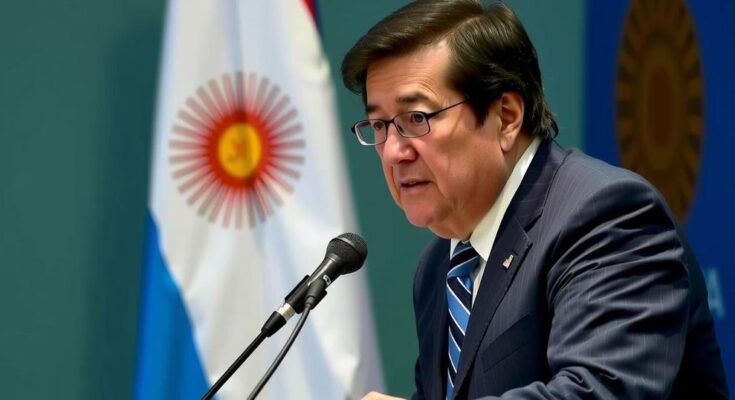President Javier Milei has removed Foreign Minister Diana Mondino after Argentina voted at the UN to lift the U.S. embargo on Cuba. Gerardo Werthein has been appointed as the new foreign minister. The vote was in favor of the resolution by 186 nations, with only the U.S. and Israel opposing it. This reflects a shift in Argentina’s traditional stance, which may influence future diplomatic relations, especially regarding the Falkland Islands.
On Wednesday, President Javier Milei of Argentina dismissed Foreign Minister Diana Mondino following the nation’s decision to vote at the United Nations in favor of lifting the longstanding U.S. embargo on Cuba. The presidency announced that former ambassador to the United States, Mr. Gerardo Werthein, has been appointed as the new foreign minister. This resolution at the UN, which gained the support of 186 member states, marked a notable shift in Argentina’s diplomatic stance, contrasting with its previous positions that were traditionally against the embargo. The only countries to oppose the measure were the United States and Israel, which are allies of President Milei’s administration, while Moldova abstained from voting. The dismissal of Mondino was promptly followed by President Milei’s retweet of a lawmaker celebrating the decision, emphasizing the administration’s disapproval of supporting what they termed as dictatorships. This political maneuver appears particularly significant considering that Argentina may require the support of Cuba and its allies in future discussions regarding its territorial claims over the Falkland Islands, which are currently under British sovereignty.
The decision by Argentina to vote in favor of lifting the U.S. embargo on Cuba is part of a broader geopolitical context wherein Latin American nations have historically had varied relationships with the island nation. The embargo, initiated in 1962, has been a contentious issue in international relations, pitting the U.S. against many countries that advocate for Cuba’s sovereignty and economic independence. Argentina, under previous administrations, generally opposed the embargo, reflecting its solidarity with Cuba as part of the leftist movements in Latin America. The recent vote signals a potential shift in Argentina’s foreign policy under the leadership of President Milei, whose administration has emphasized a different diplomatic orientation. Additionally, the internal political ramifications of this vote are significant, especially in light of Argentina’s claims over the Falkland Islands, where support from other nations, including Cuba, may be strategically important.
In conclusion, the recent dismissal of Foreign Minister Diana Mondino by President Javier Milei following Argentina’s UN vote to lift the U.S. embargo on Cuba highlights a significant shift in Argentina’s foreign policy stance. The decision reflects the government’s commitment to align with its political principles while navigating diplomatic complexities, particularly in relation to its territorial claims over the Falkland Islands. The appointment of Gerardo Werthein as her successor indicates the administration’s intention to advance its foreign relations more assertively, in light of both domestic and international expectations.
Original Source: www.barrons.com




